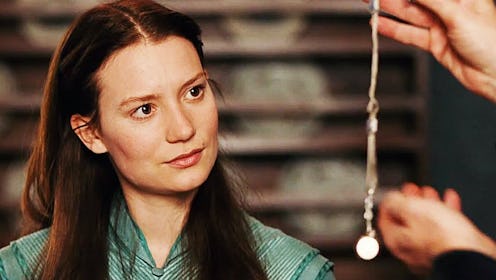Entertainment
Is 'Madame Bovary' Still Relevant?

"A lot of people think she's very unsympathetic and selfish," says Sophie Barthes, director of 2015's Madame Bovary iteration. "But for me, as a woman, I can sympathize with what she's going through." The classic Gustave Flaubert novel, a staple of required reading in French and American classrooms alike, boasts a fairly unlikable character as its protagonist. Published in 1856, the tale of Emma Bovary is bleak, depressing, cautionary. "She's lost and she's very young. She doesn't know herself very well. She doesn't have any life experience. She has no one to mentor her or teach her. She doesn't have tools nor the love around her to guide her in the right direction," Barthes says. "She ends up self-destructing."
Sophie Barthes' interpretation follows the classic story we all know from high school classrooms (or you know, SparkNotes): Emma Bovary is a sought after young woman who becomes the wife of a small-town doctor. Bored and unsatisfied with her life, Emma engages in risky behavior, including love affairs with different men, in an attempt to up her social status.
"Emma reflects something about the human condition," Barthes argues. "She was trying to survive during a time when women were so oppressed and repressed sexually. Even their clothes, like corsets, were symbols of oppression. Flaubert had a very strong feminine sensibility. When you read his words, he puts a lot of himself in Emma."
And it wasn't just women he was crafting a commentary about. "Flaubert was quite visionary. He wrote about consumption and capitalism. He always said he hated the 19th century, and he didn't like the stuffiness of French society. You can feel it in the writing — it's very angry," she says. "He was disappointed by his time. A lot of young romantics of his time were waiting to be more free. They all felt confined."
The men of Flaubert's novel and Barthes' film represent these societal struggles. They are a "symbol of something in society that is dysfunctional," Barthes says. "Homais (Paul Giamatti) symbolizes the bourgeoisie, conformists. Lheureux (Rhys Ifans) symbolizes the birth of industry and capitalism. They are caricatures of the time."
It's quite appropriate that Barthes, a French female filmmaker, would tackle a 19th century tale of oppressed women, as her line of work also has a history of creating (whether intentional or not) obstacles for women. "There is a glass ceiling, it's definitely there," Barthes says of women filmmakers. "It's very cruel. Every day you wake up and you wonder why are trying to make movies. But I worked with wonderful men who have supported me as well. But over all for a female director the industry is really hard. I don't think people are consciously trying to make it hard for you. I think it's engrained in society.
Madame Bovary opens Friday, June 12 in theaters and OnDemand. Watch an exclusive clip from the film below:
Images: Alchemy